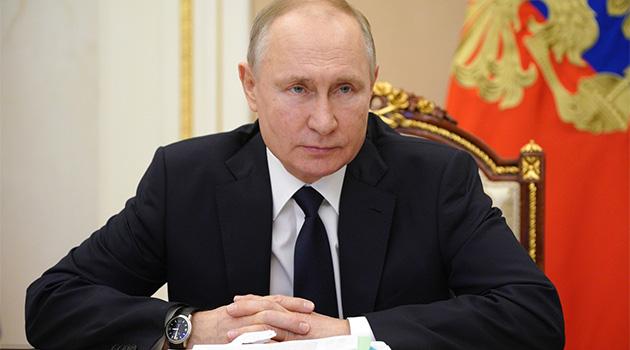Why the Kremlin talks so much about "fascism" in Ukraine

For more than a year, the Kremlin has been spouting the same analysis of the alleged reasons why Russian "had" to attack Ukraine: That a "fascist" regime governs there, that all Ukrainians are "followers" of the 20th-century far-right leader Stepan Bandera, and that President Zelenskyy is an anti-Russian "ultranationalist" and "drug addict". History is also being massively rewritten inside Russia and the Kremlin is accusing its erstwhile allies of having supported the Nazis during the Second World War.
“Many Russians still strongly believe in this alleged fight against fascism,” Czech historian of Ukrainian origin and expert on the history of Ukraine Bohdan Zilynskyj points out. “It’s a kind of leitmotif of their perception not just of their own history, but also of the global history of the 20th century. They keep going in a circle, they are either unable or unwilling to get out of it. Giving the enemy that label simply works among the majority of Russians,” he said in an interview for Czech news server HlídacíPes.org.
How to change an historical image
According to Zilynskyj, contemporary Russia is continuing its “Great Patriotic War” – just adapted for the modern world. “The front lines essentially remain the same. If one were to assess the way Putin speaks and how ‘The Great Stalin’ spoke, or some other people from the Soviet leadership, many parallels could be found,” the historian said.
Within the framework of defining Russia as against NATO and the West today, however, other elements have been added to the story. For example, propaganda in Russia is alleging that the USA and the West “actually were supporting the Nazis during the Second World War to exploit them for their main goal – the defeat of Russia“.
The actual history of the 20th century, especially the Allies’ contribution to defeating genuine Nazism, is disappearing gradually from the history of Russia there. “In a democratic society it is impossible to simply rewrite or reinterpret history with 100 % success. There will always be historians in a democracy to dispute efforts by such platforms in whose political interest it is to change the historical image. Russia is not a democratic country, though, even if formally there is a system of several political parties there,” said Zilynskyj, whose forebears emigrated to the former Czechoslovakia during the First Republic (1918-1938).
In the Russian schools, the curricula for both history and the social sciences have been trimmed down to correspond to the current political priorities. As news server Politico has reported, the curriculum called “My Country” offers quite a selectively-colored telling of history that, for example, absolutely ignores the famine in the 1930s (the Holodomor) that was begun and controlled by the Soviets, in which millions of Ukrainians died.
In Ukraine, on the other hand, the famine of the 1930s is a strong element in their collective memory. “Most Ukrainians have the memory of the famine under their skin, it stays with them. That’s also because it was kept secret for the next 50 years: Their reaction was a form of self-defense, people passed on the tradition of remembrance among themselves irrespective of the fact that the information was officially either suppressed, or denied, or completely distorted. It did not begin to be written about again there until roughly the late 1980s. Today nobody doubts the facts in Ukraine, and what’s more, if there are some eyewitnesses to that history still living, direct family memories of those days are being heard,” Zilynskyj said.
A “catastrophic factor” in contemporary Russia, according to the historian, is how history is being taught in the schools: “In recent decades there has been an apparent effort to negate all of the findings that historiography in Russia had achieved since the Gorbachev era, from the mid-1980s, whether they are about those crazy political show trials of the 1930s or the Molotov-Ribbentrop Pact. Today, once again, everybody pretends that either none of that happened, or that there is no point in discussing it, or that those were simply the circumstances of those days. Given that different opinion polls in Russia still find the public says Stalin is the greatest figure in their history, there’s not much more to add.”
Bandera as a symbol
In the Czech public debate, those who criticize Ukraine and support Putin also regularly mention the “Banderites”. Stepan Bandera was a leader of the Ukrainian national movement in western Ukraine and later of the Ukrainian rebel army whose members were called the Banderites.
Historian Zilynskyj describes how Bandera is perceived in Russia and Ukraine today as follows: “Bandera had already become a symbol of the fight for Ukrainian independence. I dare say most Ukrainians are unaware of the details of his biography. Understandably, local people here in the Czech Republic who keep commenting on this don’t know the whole story either. Since the 1990s there has been an attempt to clear the name of this figure from the taint of Soviet propaganda and to explain his current importance to post-Soviet Ukraine. In today’s Ukraine there is a tendency to speak of Bandera in rather a positive sense, although I believe the controversial things about him are not ignored. He was shaped by his times, and from today’s perspective he is problematic in many respects, but that applies to many leaders of various national liberation movements. I think Putin, by attacking Ukraine, has basically multiplied the adoration of Bandera, which is sometimes critical, sometimes not. Inside Russia, though, the staining of Bandera’s reputation still continues to work among the vast majority of the population.”
The Czech original version of this article was written for the Institute for Independent Journalism, an independent nonprofit organization and registered institute focused on the provision of information, news reporting and journalism. Its articles, analyses and data are available for use under predetermined conditions.